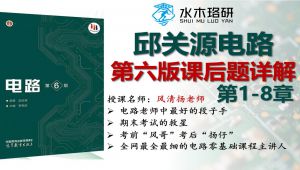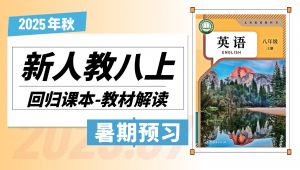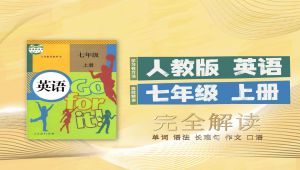- 一轮复习】1. 1-1中考语法命题趋势及知识框架
- 2. 1-2一般现在时
- 3. 1-3一般过去时
- 4. 1-4一般将来时
- 5. 1-5时态实战演练
- 6. 1-6现在进行时
- 7. 1-7过去进行时
- 8. 1-8现在完成时
- 9. 1-9实战演练和动词辨析
- 10. 2-1被动语态
- 11. 2-2不用被动语态的情况
- 12. 3-1情态动词
- 13. 3-2动词辨析
- 14. 3-3动词词组辨析1
- 15. 3-4动词词组辨析2
- 16. 3-5动词词组辨析3
- 17. 4-1形容词副词的同级比较
- 18. 4-2形容词副词级别变化规则和比较级用法
- 19. 4-3最高级用法、形容词辨析
- 20. 5-1名词
- 21. 6-1人称代词、物主代词、反身代词
- 22. 6-2代词辨析1
- 23. 6-3代词辨析2
- 24. 7-1冠词
- 25. 8-1数词和介词
- 26. 9-1谓语动词&非谓语动词区分
- 27. 9-2作宾语的非谓语形式
- 28. 9-3作宾补和作定语的非谓语形式
- 29. 10-1主谓一致1
- 30. 10-2主谓一致2、倒装知识结构
- 31. 11-1简单句
- 32. 12-1并列句
- 33. 12-2状语从句
- 34. 12-3宾语从句
- 35. 12-4定语从句
- 36. 13-1听力命题趋势&考试难点
- 37. 13-2听力能力提高&解题方法
- 38. 13-3听力题型之图片题
- 39. 13-4听力题型之问答题
- 40. 13-5听力题型之填表题
- 41. 14-1完型考试动向及考查内容
- 42. 14-2完型技巧+真题演练1
- 43. 14-3如何提高完型刷题效率
- 44. 14-4完型技巧+真题演练2
- 45. 14-5完型技巧+真题演练3
- 46. 15-1阅读理解命题动向及常见困境
- 47. 15-2常考文章类型之应用文
- 48. 15-3常考文章类型之说明文
- 49. 15-4常考文章类型之议论文
- 50. 15-5常考文章类型之记叙文
- 51. 15-6常考问题类型之细节理解题
- 52. 15-7常考问题类型之推理判断题
- 53. 15-8长难句理解1
- 54. 15-9常考问题类型之词义猜测题
- 55. 15-10常考问题类型之主旨大意题
- 56. 15-11常考问题类型之还原型题目
- 57. 15-12常考问题类型之回答问题型
- 58. 15-13长难句理解2
- 59. 16-1中考写作试题介绍
- 60. 16-2中考写作体裁、题材、写作要求
- 61. 16-3中考写作复习方法
- 62. 16-4标点符号知识
- 63. 16-5六大基本句型
- 64. 16-6常见句子结构
- 65. 16-7常见语法错误
- 66. 16-8七个必会闪光句型
- 67. 16-9行文连贯、语言得体
- 【二轮复习】1. 1-1直接法解单项选择题
- 2. 1-2关键词法解单项选择题
- 3. 1-3类推法解单项选择题
- 4. 1-4前后照应法解单项选择题
- 5. 1-5排除法解单项选择题
- 6. 1-6交际法解单项选择题
- 7. 1-7单项选择题注意事项
- 8. 2-1完形填空题的题型特点
- 9. 2-2完形填空题的类型
- 10. 2-3完形填空题的解题技巧
- 11. 2-4完形填空题的解题步骤
- 12. 3-1猜测词义题解题技巧
- 13. 3-2推理判断题方法攻略
- 14. 3-3阅读理解题常见解题失误归类分析
- 15. 3-4阅读理解题常见解题失误应对措施
- 16. 4-1应用文写作
- 17. 4-2记叙文写作
- 18. 4-3议论文写作
- 19. 4-4写作中经常出现的错误
- 20. 4-5写出一篇好文章的六大法则
- 21. 4-6如何写出一篇好文章
- 22. 4-7如何美化自己的文章
- 【三轮复习】1. 1-1听力理解题失分原因
- 2. 1-2听力理解题的备战方法和考场技巧
- 3. 2-1单项选择题策略
- 4. 3-1完形填空题的失分原因和备战方法
- 5. 3-2完形填空题的考场技巧
- 6. 3-3完形填空题实战演练
- 7. 4-1阅读理解失分原因
- 8. 4-2阅读理解备战方法及考场技巧
- 9. 4-3阅读理解实战演练
- 10. 5-1书面表达题的失分原因和备战方法
- 11. 5-2书面表达题的考场技巧
一、名词
关于名词,我们必须掌握名词的数,名词的格。单数可用a、an来修饰可数名词单数,在元音发音开头的单词前用an,而不是a
1.复数的构成方法:(1)一般在复数名词后加s,如:dog--dogs。
(2)以s、x、ch、sh结尾的名词加es,如:watch--watches。
(3)以辅音字母加y结尾的名词,变y为i加es, 如:country--countries。请区别:如果是元音字母加y结尾的名词,则只须加s。 如:monkey--monkeys。
(4)以o结尾的名词,只有potato(土豆),tomato(西红柿)加es构成复数。
(5)以f、fe结尾的名词,变f、fe为v再加es, 如:knife--knives。
2.单复数形式相同的词:sheep--sheep,fish--fish Chinese--Chinese,Japanese--Japanese
3.特殊变化的单词有:(1)tooth--teeth,foot--feeth
(2)man--men,woman--women,policeman--policemen,Frenchman--Frenchmen
请区别:German(德国人)—Germans (3)child—children
4.常以复数形式出现的名词:people(人),clothes(衣服),trousers(裤子) glasses(眼镜) ,这些名词作主语时,同学们应特别注意它们的谓语,用复数。 如:My clothes are (be) newer than yours.
5.有些名词看似复数形式,实际上是单数。这一点是同学不易掌握的,应特别加以记忆。如:news(消息),maths(数学),physics(物理) No news is good news.
6.可用how many,many,a few,few,a lot of,lots of,some,any等来修饰可数名词复数。 How many are there in your pencil-box?(knife)
不可数名词:
1.常见的不可数名词有:water,rice,fish,meat,等。应特别记medicine,news,work,homework,housework,money,chalk,weather,cotton,wood.
2.不可数名词无复数,作主语时常看成单数。如:Some bread__________over there.(be)
3.常用how much,much,a little,little,a lot of,some,any等来修饰不可数名词。
4.常用a piece of,a cup of等来表示不可数名词的量。如要表达“两片面包”这样的意义,bread仍为不可数名词,不加s,而piece则可加s。即:twopiecesof bread
请区别:可数名词也可用量来表示,
如:三箱苹果three boxes of apples
例:
1、These two pieces of bread __________over there.(be)
2、Could I have three ___________,please?
A.piece of bread B.piece of breads
C.pieces of bread D.pieces of breads
名词的格
名词所有格的构成方法,在名词后加“ 's”。如:Tom→Tom's译为“…的”,若遇上以s结尾的复数名词,则在s后加“ '”即可。如:Teachers'Day , twoweeks'holiday,而不以s结尾的复数名词的所有格,仍按惯例加's 。如:Children's Day
关于名词所有格,应掌握以下几点:
1.可用名词所有格表示地点。 如:my aunt's 我姑姑家。go to the doctor's 去医生家。
2.表示两人共同拥有,在最后一个名词后加's 如:Lucy and Lily's 露西和莉莉的
3.掌握词组:a girl of five 一个五岁的女孩 a friend of mine 我的一个朋友
eg;The white shirt is and blue one is .
A、Kate,my B.Kate's,mine C.Kate,mine D.Kate's,my
二、冠词
冠词是词汇中的基础的,也是简单的部分,所以同学们有必要掌握其基本用法,归纳起来,同学们应该掌握以下几点:1.冠词指不定冠词a,an和定冠词the
2.不定冠词an常用于元音发音开头的词前,如:an hour,an English car. 请区别:a useful machine
3.指上文提到过的人或物,用定冠词the
4.在世界上独一无二的事物前用定冠词the.如:the sun,the moon,the earth
5.定冠词the用于序数词前,表示方位的名词和形容词最高级前。如:the first,the best ,in the south
6.在复数姓氏前加the,表示××一家人,常看成复数。
如:The Browns are going to Shanghai for a holiday this summer.
7.在介词短语中常用定冠词the,如:in the box ,behind the chair
8.特别注意不能用定冠词the的几个方面:
(1)在节日、星期、月份、季节、年等词前不用冠词。如:in summer,in August
请区别:in the spring of 1945. (这里表示特指,故加the)
(2)一日三餐和球类运动名不用冠词。 如:have breakfast ,play football
(3)一些固定词组中,如:go to bed ,go to school,by bus ,at night.
9.在有些词组中,有冠词和无冠词意思不同,请注意区别:
in front of 在…前面 in the hospital 在医院里
in the front of 在…范围内的前部 in hospital (生病)住院
练习:There's _________800-metre-long road behind _________hospital.
A.an,an B.a, a C.an, the D.a, the
三、数词
同学们首先应会读会写所有基数词和序数词,以及与数词有关的钟点表达法。对数词的考查,中考常采用单选题及听力题,这些题型归纳起来,应掌握以下几点特别容易出错的地方。
1.基数词变序数词。其规律为:
1,2,3特殊记,加th从4起 (first,second,third,fourth)
8少t,9去e,千万别忘记 (eighth,ninth) 逢5逢12,ve变f (fifth,twelfth)
20到90,y要变ie (twentieth,ninetieth) 若是几十几,前基后序别倒位 (ninety-first)
2.hundred,thousand,million 在构成具体的数字时用单数形式。 如:five hundred people. 只有在表达笼统的多数时才加s,构成复数形式。
hundreds of 数以百计的,成百上千的 thousands of 数以千计的,成千上万的
millions of 数百万的 这些词组前不能用具体数字。
3.序数词常与定冠词the 连用。练习:①Henry has learned eight _________ French words this year.
A.hundred B.hundreds C.hundred of D.hundreds of
②The _________lesson is the most difficult one in Book Two. (twenty)
另外,同学们还应掌握与数词有关的钟点表达法。
顺读法(钟点+分钟) 如:4:30 four thirty 4:45 four forty-five
4:15 four fifteen 倒读法(分钟+to/past+钟点) 如:4:30 half past four
4:15 fifteen past four/a quarter past four 4:45 fifteen to five/a quarter to five
练习题 :
1.At the beginning of the_____(twenty) century,the world's population was about1700 million.
2.Are these_____(watch)yours? Yes.
3.You don't look well.You'd better go to the______(doctor) at once.
4.Would you give me________,please?
A.two papers B.two piece of paper C.two pieces of paper D.two pieces of papers
5.There are three_____and seven____in the picture.
A.monkeys,sheeps B.monkeys,sheep C.monkies,sheep D.monkies,sheeps
6.A lot of____are talking with two_______.
A.Germans,Frenchmans B.Germen,Frenchmans C.German, Frenchmen D.Germans,Frenchmen
7.June 1 is __.
A.the Children's Day B.the Childrens' Day
C.Children's Day D.Childrens' Day
8.__________people went out to see what had happened.
A.Thousands of B.Three thousand of
C.Thousand of D.Three thousands
9.We have been in the school for______.
A.three and a half month B.three and a half months
C.three month and a half D.three months and half
10.__________English is___________ useful language.
A.A, an B./, a C.The, an D. A, /
11.John was given _______ orange bag for his birthday but ______ bag was lost just now.
A.an,a B.a,the C.the,a D.an,the
12.There's________old tree near _______ house.
A.a,an B.an,the C.a,the D.the,a
13.There is ________ 800-metre-long road behind _________ hospital.
A.an,an B.a,a C.an,the D.a,the
四.代词
①人称代词: 主格: 单数I 、you 、he 、she 、it 复数 we 、you 、they
宾格: 单数me 、you 、him 、her 、it 复数us 、you 、them
⑵物主代词: 形容词性 my 、your 、his 、her 、its 、our 、your 、their
名词性 mine 、yours 、his 、hers 、its 、ours 、yours 、theirs
③反身代词: myself 、yourself 、himself 、herself 、itself 、ourselves 、yourselves 、themselves
1.形容词性物主代词在句中只能作定语,相当于一个形容词,名词性物主代词在句中可作表语、主语和宾语,相当于一个名词。
2.注意名词性物主代词在句中所指代的关系,是单数还是复数。
如:⑴These books aren't ours. Ours are new. (这里ours=our books)
⑵This is not our room. Ours is over there. (这里ours=our room)
3."of+名词性物主代词"表示所属 如:a sister of his 他的一个妹妹 a friend of mine 我的一个朋友
4.人称代词在并列使用时的顺序为:“第二人称,第三人称,第一人称”。如:You, she and I all enjoy the music.
5.关于反身代词,同学们须掌握其固定结构:
enjoy oneself=have a good time (过得很愉快) by oneself=alone (单独、独自)
help oneself to… (随便吃/喝 些...)
learn sth. by oneself =teach oneself sth. (自学)
练习题
1.-Whose trousers are these? -_____, I think.
A.They B.Their C.Theirs D.Them
2. Nobody taught___English. He taught____. A.him, himself B.his, himself C.him, by himself D.his, his
(二) 修饰可数名词 many few 表否定意义
a few 表肯定意义修饰不数名词 much little 表否定意义 a little 表肯定意义 few 和 little 与 quite 或 only 连用时,常加不定冠词 a.如:There are quite a few new books in the library.=
用little, a little, few, a few填空:
1.I often stay at home because I have _______ friends here.
2.Jim,don't go and get some water. There is ______ water in the glass.
3.Though he learned French only ________ weeks. He can speak very well.
4.Lily had _________ bread because she was hungry yesterday.
(三)不定代词: something, anything, nothing.
当形容词修饰这三个不定代词时,常后置。 如:something new
There's __________ in today's newspaper. 中考题
A.important anything B.important something C.anything important D.something important
(四)另外,还要注意代词some, every, all, both, either, another
1.some(一些,某) 一般用于肯定句中 注:some有时也可用于表示请求的疑问句中。
any(任何) 多用于疑问句和否定句
① Will you give me some water? ② Would you like some meat?
③ May I ask some questions? ④ Could I have some apples?
2.every+单数名词 “每一个” 强调共性,作定语,形式上为单数。
each “每一个” 强调个性,作定语、主语、宾语和同位语,常与of连用。
如: Each student was asked to try again. Each of them has a nice skirt.
Every child likes playing games.
3.all “(全部)都” 表示三者或三者以上,作同位语时,一般放在连系、助动词之后,行为动词之前。
none “没有”表示三者或三者以上都不,后常跟介词of
如:We are all from Canada. = All of us are from Canada.
None of us is/are afraid of dogs.(单、复数均可)
4.both “(两者)都” ,作主语时,看作复数;作定语时,后跟名词复数。
either “两者中任何一个” ,作主语时,谓语用第三人称单数;作定语时,后跟名词单数。
neither “(两者)都不”,含有否定意义,用法同either。
如:①They both swim well. =Both of them swim well.
②There are trees on both sides of the street. = There are trees on either side of the street.
③Neither of us is going to Beijing next week.
④Neither answer is right.
5. another +单数名词, “另一个”
one … the other “一个……,另一个……”
the other +复数名词 = the others “其他的人或物” (指确定范围内剩下的全部) others “别人”
(五)疑问代词 5个“wh”, 即who, whose, whom, what, which
这里,which是同学们不易掌握的内容,其实,同学们只须记住,对作定语的内容提问,常用which.
例如: I like the red shirt. ___________ ___________ do you like ?
初三英语中考总复习资料
重要的短语、句型和惯用法(一)
1. get on/off(the bus) 上/下车
get up 起床
get ready for 为...作准备
get oneself dressed 自己穿衣服
get well (better) 身体好
get in 进入,收集
get sb.sth.=get sth.for sb. 为某人买某物
get on well with sb/sth. 与某人相处很好,...进展顺利
2. have an accident 出事故
have a good time =enjoy oneself 玩得很高兴
have a cold wet day 天气又冷又湿
have a cough 咳嗽
have a drink(of)... 喝一杯...
have a talk 听报告
have lunch 吃午饭
have...for lunch 午饭吃...
have a meeting 开会
have no idea 不知道
have a rest 休息一下
3. make a mistake 犯错误
mistake A for B 把A错认为B
take sth. by mistake 错拿某物
4. make friends with 与...交朋友
make faces 做鬼脸
make a fire 生火
make an excuse 找籍口
make a...sound 发...音
make tea 沏茶
make room for... 为...找出空间
make it 如期赴约
make a team 组成一个队
eg.Let's make it half past one. 注意:时间前不用介词at
5. turn sth. on/off 打开/关掉...
turn sth. up/down 把...音量开大/小
注意:当sth 是代词时,常放中间
6. try sth. on 试穿(衣、鞋、帽)
注意:当 sth 为it或them, 常放中间try out 试验、尝试
try one's best to do sth. 尽力干某事=do one's best to do sth. 7. send sb. away 开除、解雇某人
send for sb. 派人去请某人
send up 发射
8. hear from sb 收到...的来信
hear of 听说
9. hurry off 匆匆离去,赶快去
hurry up 赶快
10. get to +名词 get +副词(不用to)
reach+名词/副词
arrive in/at +大/小地点 (后接副词,不用at/in)
eg. get to Shanghai、reach Shanghai 、arrive in Shanghai到达上海
eg. reach home、get home、arrive home 到家
11. teach sb. English 教某人英语
teach oneself=learn sth.by oneself 自学
12.到...末为止 by the end of +过去时间 (用于过去完成时)
by the end of +将来时间 (用于一般将来时)
at the end of+地点 在...尽头 in the end= at last 最后,终于
13. hundreds of 成百上千
thousands of 成千上万的
millions of 成百万的
14. be pleased to do sth 很高兴地干某事
be pleased with sth. 为某事而高兴
15. be used for 被用来
be used as 被当作
be used by 被...所使用
16. so far 到目前为止, 用于现在完成时
17. on a Tuesday morning 一个星期二的早上
on the morning of June 15th.1998 在1998年6月15日早上
18. keep sb.doing sth. 让某人一直干某事
keep doing sth. 继续做某事
keep on doing sth. 持续不断地做某事
19. much too+形容词/副词原级 实在太...
too much+不可数名词 相当多的... eg. It's _______ expensive. I can't buy it.
There's ___________ rain this year.
20. thanks to...由于,多亏
thanks to one's help=because of one's help 由于某人的帮忙
thanks for one's help 谢谢某人的帮助
21. be far away from+a place/sb 远离某地
22. wear out 穿坏、穿旧、用尽 常用于被动语态。其P.P为worn
sell out 售完 卖完
23. two-month holiday=two months' holiday 二个月的假期
24. fall asleep 入睡(进入状态)
get to sleep 入睡(还没睡着)
25. stop sb.from doing sth. 阻止某人干某事
eg. She stopped the child from listening.
stop doing sth. 停止干某事,不再干某事
stop to do sth. 停止下来干另一件事。
26. hardly any +n. 几乎没有...
27. quite a/an+形容词+名词 一个相当...eg. Two months is quite a long time.
a very +形容词+名词eg. English is a very useful language.
28. be afraid of+名词 害怕...
be afraid to+动词 担心、害怕...
be afraid that+从句 恐怕...
29. so+形容词 so strong so beautiful
such+形容词+名词(复数或不可数)
such beautiful pictures such nice smell
such + a/an+形容词+名词(单数)
such an interesting story
30. feel like doing 想干某事
31. be made/grown/produced
三个词的被动语态都可解释为“生产”
归类: 机器一类→make(制造)
盐.糖.丝绸→produce (经机器加工生产) 农作物、水果→grow (人工种出来的)
32. finish doing sth. 做完某事
be busy doing sth. 忙于干某事
go on doing sth. 继续干某事
be always doing 老是干某事
33. hope to do sth. 希望干某事 ...
hope that...希望某人干某事,不可用
hope sb.to do sth.
34. in surprise 惊奇地(作状语)
be surprised at sb. 对某人的举动感到诧异
be surprised to do sth. 对做某事感到惊讶
35. no space(room) to stand in 没有站的地方、空间
36. be angry with sb. 生某人的气
agree with sb. 同意某人的观点
with one's help 在某人的帮助下
选择题:
1.They arrived ___ London___ a cold winter night.
A.at, in B.in, on C.at, on D.in, at
2.It's rather cold today.You'd better ___ more clothes before you go out.
A.put on B.wear C.to put on D.to wear
3.You must be very tired. Why not ___ a rest?
A.stop taking B.stop to take C.to stop taking D.to stop to take
4.___, I've caught up with my classmates in my English studies.
A.Under his help B.With his help C.Under the help of him D.With the help of him
5.Mother told me ____ in the sun. A.not read B.don't read C.read not D.not to read
6.Watching TV ___ is bad for your eyes. A.much too B.many too C.too much D.too many
7.Those foreign visitors ___ our city the day before yesterday.
A.arrived B.reached C.reached to D.got in
8.She asked me to help her ___ her Chinese. A.at B.with C.for D.on
9.Look ___ the words in the dictionary when you don't know ___ they mean.
A.up, what B.up, that C.for, that D.for, what
10.One after another, three of them ___.
A.fell asleep B.got to asleep C.went to asleep D.were sleeping
完成句子:
1.你想不想喝杯桔子汁? Do you ______ ______drinking a glass of orange?
2.小杨毕业离校以来,我们从未收到他的来信。
We have never ______ ______ Xiao Yang since he _______ school for the last time.
3.人们兴建绿色长城是为了阻止风将土刮走。
People started to build the Great Green Wall ___ ___ it could stop the wind from ___ the earth away.
4.魏华把你错当成他的兄弟,是吗?
Wei Hua ________ you ______ his brother,didn't she?
重要的短语、句型和惯用法(二)
1.There be 结构
a.这是英语中常见的一种结构,表示“某地有某物”其含义为“存在有”。
eg.There are twenty girls in our class.have也解释为“有”但是与there be有区别,它的含义是“所有,属有”,其主语为某人。eg.I have a nice watch.
b.There be 结构中的be动词要和后面所跟名词保持一致。
c.There is a river near our school.否:There is not a river near our school.
问:Is there a river near our school.回答:Yes, there is. No, there isn't.
划⑴How many rivers are there near our school? ⑵What's near our school?
d.there be 结构的一般将来时,同学们较难掌握,其正确形式为:there is going to be
e.反意疑问句的构成:There is no water in the glass, is there?
①There is going to _____ a football match this afternoon. A.have B.watch C.be D.play
②They were sure that they were going to ____ a rest. A.be B.have C.be on D.on
2.so,neither引导的倒装句,为了避免和前一句话的内容重复,英语中习惯用so,neither引导的倒装句。
a.So+be(助动词,情态动词)+主语。表示某人也是如此。
eg.Mike has bought some foreign stamps. So has Bob.=Bob has bought some,too.
b.Neither+be(助动词,情态动词)+主语,表示某人也不。
eg.Mother has never been to Japan. Neither has Father.=Father has never been to Japan, either.
c.So+主语+be(助动词,情态动词)。表示果真如此(赞同), 请同学们与a.区别。
eg.A:Mike is right in the classroom. B:So he is.=He is really in the class room.
3.It's+时间+since动词过去式。自从...起已有...时间了。
⑴It's two weeks since we met last.(自从我们上次见面已有两个星期了)
⑵How long is it since we left Beijing?(自从我们离开北京已有多久了
4.祈使句+and (那么)...eg.Go straight on and you'll see a school.=If you go straight on, you'll see a school.
5.祈使句+or...否则...eg.Work hard, or you will fall behind the other students. =If you don't work hard, you'll fall behind the other
6. The+比较级...,the+比较级... 越...越...
eg.⑴The more, the better. 越多越好。
⑵The harder you work on it, the better you'll be at it.(你越用功,你就越好。)
7.How do you like the film? =What do you think of the film? (你认为这部电影怎样?)
8.What...do with...?怎样对付...?怎样处理...?
虽然中文为怎样,我们绝不可照字面翻译为how.
eg.A:What have you done with the library book? B:I've just returned it to the library.
9.I don't know what to do.我不知道该怎么办? I don't know how to do. ×
10.What...be like?...是什么样的?
eg.⑴What's the weather like? 天气如何?⑵What's your school like? 你们学校是什么样的?
11.What...for?为何目的?为什么?eg.What do you want a science lab for?=Why do you want a science lab?
12.one of +最高级+复数 最...之一eg.Miss Zhao is one of the most popular teachers.
13.find it +形容词+to do eg.I find it useful to learn English well. (我发觉学好英语是很有用的)
find +宾语 +名词eg.I find him a good boy. (我发现他是个好男孩.)
find +宾语 +形容词
eg.I find the door open/closed. (我发现门开/关着) I find our bags filled with/full of presents. (我发现我们的包装满了礼物)
14.I don't think+肯定句 我想...不 eg.I don't think I'll take it. (我想我不买它了)
请注意:中文意思否定在从句中,但是英语的表达否定在主句中。
15.prefer A to B=like A better than B 更喜欢A不怎么喜欢B.
eg. I prefer fish to chicken.= I like fish better than chicken
16.had better do sth.最好干某事.否定:had better not do sth.
特别注意:had better后面跟be动词词组,不可漏掉be.eg.You'd better catch a train.
You'd better not talk in class.You'd better not be late for the class.
17.It is good (nice)of+宾格+to do sth.
eg.It is very good of you to teach me English. (你教我英语真是太好了)
18.It takes sb. some time to do sth.(干某事化费某人多少时间)
=sb.spend some time on sth. (in) doing sth.eg.It took me half an hour to do the work.
=I spent half anhourin doing the work.
19.sb.pay 钱 for 物 某物化费了某人多少钱=sb.spend 钱 on 物 =物 cost sb.钱 , pay的过去式为paid 而不是payed. eg.I paid thirty yuan for the coat. =I spent thirty yuan on the coat.
=The coat cost me thirty yuan. 20.have been to 某人曾去过某地,现在人不在那儿
sb.have been in +地点 某人呆在某地(一段时间) have gone to 某人已去某地,人不在这儿
21.⑴ too…形容词(副词)+to…"太…而不能" "太…以致于不"
eg.①The basket is too heavy for me to carry. 这篮子太重我拿不动。 ②This colour TV is too expensive for us to buy. 这台彩电对我们来说太贵了,买不起。
⑵so...that 如此...以致于...上面的too...to结构的句子,可以换成so...that 引导的句子转换。①The basket is so heavy that I can't carry it. ②This colour TV is so expensive that we can't afford it.
22.What's the population of ...? ...人口有多少? 不说How much population in...?形容人口数量的大用large eg.The population of China is ten times as large as that of the USA
23.I've come to return your pan. (我跑来是还你锅的) →Why have you come? 而不用What
24.not...until (连词)方才,才
eg.He says that he won't be free until tomorrow.他说他需到明天方才有空。 肯定句+until 到
eg.You'd better wait until tomorrow. (你最好等到明天)
25.neither...nor... 既不...也不... either...or... 或者...或者...
eg.Neither Tom nor his brothers know how to spell the word "hundred".
Either you or she is right. (谓语动词就近原则)
both...and... 两者都... eg.Both Jim and I are in Grade One (主语看作复数)
二、形容词 副词大多数的形容词、副词都有三个等级: 原级:比较级: 比较...,更...一些 最高级: 最...
(A)1.构成:(规则情况)情况 变 化 方 法 例 词单音节词和少数双音节词: 一般情况 加er, est clever-cleverer-cleverest
以字母e结尾 加r, st nice-nicer-nicest
重读闭音节、末尾只有一个辅音字母时 双写加er, est big-bigger-biggest
以辅音字母加y结尾 变y为i加er, est early-earlier-earliest
部分双音节和多音节词 在词前加more, most slowly-more slowly-most slowly
2.不规则变化,须熟记:good/well-better-best many/much-more-most far-farther-farthest
bad/badly/ill-worse-worst little-less-least
(B)常见的使用情况
1.as … as … 和...一样(中间用原级)
2.not as(so) … as 和...不一样(中间用原级)
3… than …. ..比...(用比较级)
4.有范围修饰的用最高级 如:in, of, among或用从句修饰的
eg.⑴Winter is the coldest season of the year. ⑵This is the best film that I have ever seen .
5.比较级+and+比较级 意为“越来越….eg: wetter and wetter more and more beautiful
6. The+比较级,the+比较级 越…...就越…... eg:The more, the better. 越多越好
(C)注意点:1.形容词最高级前一定要用the,副词最高级前可省略。
2.可用much, a little, even, still等修饰比较级。
3.在比较级中为了避免重复,在than后常用one,that,those等词来替代前面提到过的名词。
eg:The weather here is warmer than that of Shanghai.
(D)掌握三种同义句转换:
1.He is taller than any other student in his class. =He is the tallest (student)in his class.
2.This film is less interesting than that one. =This film isn't as interesting as that one.
=That film is more interesting than this one.
3.I prefer maths to English. =I like maths better than English.
Which do you like _____, fish, meat _____ eggs? A.best, or B.better,or C.best, and D.better,and
此外,关于形容词、副词的内容同学们还须掌握:
1.形容词修饰名词作定语,跟在连系动词之后作表语。
2.副词修饰动词、形容词或其它副词 enough属例外词:形/副+enough to do enough+名词
例如;She is old enough to go to school. 她够上学的年龄了。
3.区别几组易混淆的副词: 也 too用于肯定、疑问句 also 较为正式书面语 either 用于否定句 已经 already 常用于肯定句、疑问句 yet 常用于否定句、疑问句
不再 no (not any) longer 从时间上讲 no (not any) more 从动作上讲
如此这样 such 修饰名词 eg: such a big box
so 修饰形容词、副词 eg: so big 单独、独自 alone 作表语 =by oneself 孤独的 lonely 可作表语、定语 eg:A group of girls are singing and dancing ______ over there. (happy)
练习题
1.The students are having a good time in the park. Some are drawing by the lake. _ are climbing the hill.
A.Others B. Other C. Another D.The other
2.There isn't _____ in today's newspaper.
A. important something B. important anything C. anything important D. nothing important
3.-Whose watch is this, Mary? Is it your sister's?
-No,Mum. It's not ______. It's ______. A.hers, my B. her, my C. Mine, hers D.hers, mine
4..The Changjiang River is the third __ river in the world. A.long B.longer C.longest D.the longest
5. An elephant is _____ than a horse.
A.more strong B. much stronger C. the most strong D. much more strong
6. Which do you like _____, tea, orange or water? A.good B.Well C. Better D. Best
三、介词
1.与形容词搭配的词组有: be afraid of (怕) be angry with (生某人的气)
be away from (不在某地) be different from (与…不同)
be good at (善于) be good/ bad for (对…有益/有害) be interested in (对…感兴趣) be late for (迟到) be/get ready for (为作好准备) be sure of (对…有把握)
be worried about (为…感到担忧)
2.介词后常用人称代词宾格和动词-ing形式
1)You must take good care of her. 2)Thank you for teaching us so well.
3.几组易混淆的介词
A. “在...之后” in + 一段时间(用于一般将来时)
after + 一段时间(用于一般过去时) after + 一点时间(常用于一般将来时)
如:The baby stopped crying after half an hour.
The baby will stop crying in half an hour. They will visit their teacher after Friday.
B. for +一段时间 since +过去的一点时间
这两者均用于现在完成时,具体在时态部分,我会继续向同学们讲解。
C. be made of "用……制成" be made in “由某地制造”be made by somebody “由某人制成”
D. in, on, at表时间 in “在某月(季节、年)等” eg:in 1996, in January, in summer
固定词组:in the morning, in a week,in a minute,in time, in the end
on "用于指具体的某一天或专指某一天上午、下午或晚上等"
eg:on Christmas Day, on the night of February 16
at “用于具体时刻前和某些固定词组中”
固定词组:at seven, at the moment, at night, at last, at first, at noon, at times, at once, at this time of the year, at the beginning of, at the end of this month, at the same time 注意:在表时间里,下列情况下一般不用介词。词组里有:next, last, this, that, tomorrow, yesterday, one, every, all 以及the day before yesterday和the day after tomorrow 前不用介词 。 如:不能说 in tomorrow ,只能说 tomorrow 在明天
E. except +宾格/doing something "除…之外” (不包括本身)
Everyone is at school today except Lin Tao. (同义句转换) =Only Lin Tao isn't at school today.
F. “用” 通过交通工具 by plane
用语言 in English 通过媒介 on /over the telephone, on /over the radio, on TV
用工具手段 with a pen, with one's hands
G. between “在~和~(两者)之间”
between...and..., between the two... among 在...之间(三者或三者以上)
eg.Sue spent over two hours ___ her homework yesterday evening. A.on B.with C.at D.over
四、连词
1.并列连词
both…and 既~又~谓语用复数动词
neither…nor 既不~也不~含否定意义,(就近原则)谓语动词由靠近它的那个主语来决定单复数。 either…or… “或者 …或者…”“不是…就是…”
and“和” 连接两个并列成分,连接谓语时,两个动词时态应一致。
but “但是” 表转折,不能与 though 同时出现在句中。
or “或者”在否定句中,并列句中的列举常用 or,而不用 and。 Eg: I have brothers and sisters.(否) I don't have brothers or sisters.= I have no brothers and no sisters.
2.引导宾语从句的连词
陈述句:that 可省略 一般疑问句:if /whether “是否” 特殊疑问句:特殊疑问词
3.引导原因状从的有:because (不能与so同时出现在句中)
4.引导时间状语从句的连词:
A. when(当…时候),as soon as…(一…就),not…until(直到…才),after(在…之后),引导的主从复合句,主句为一般将来时,从句则用一般现在时来代替一般将来时。Eg: I won't leave until he comes back.
B. since(自从…以来)引导的主从复合句,主句为现在完成时,从句用一般过去时。 Eg:We haven't met each other since she left here last year.
C. while(当…时候,一边…一边…)它引导的时间状语从句常用进行时态。
Eg: My father came in while I was doing my homework.
5.引导条件状语从句的连词:if “如果”,引导条件状从,主句用一般将来时,从句则用一般现在时。请区别于if“是否”相当于 whether,引导宾语从句,时态根据语境确定
eg:1)I don't know if it ____ (rain) tomorrow.
2)If it ______ (rain) tomorrow, I _____________ (not climb) the hills.
3)Joan and Mary haven't seen each other_____they left school five years ago.
A.as B.before C.after D.since
ew C. a little D. little








